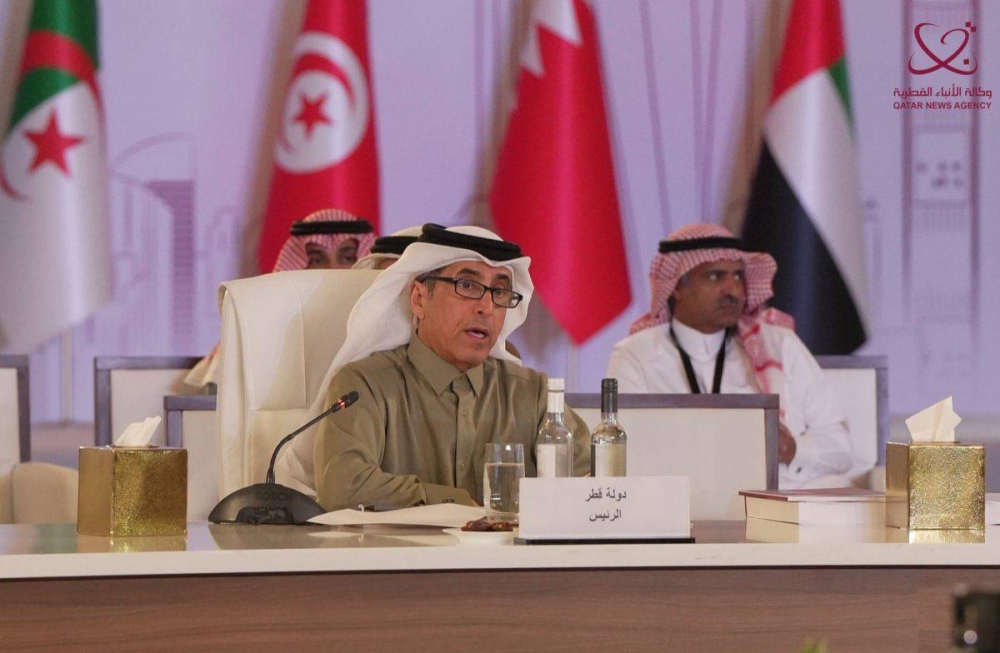QNA
Doha
The 14th ALECSO Conference of Arab Ministers of Education commenced in Doha on Sunday.
The conference is organised by the Arab League Educational, Cultural and Scientific Organisation (ALECSO), in partnership with the Ministry of Education and Higher Education (MoEHE) and the Qatar National Commission for Education, Culture and Science, under the theme ‘Comprehensive education and empowering teachers: a strategic vision for education in the Arab world’.
In his opening speech, Undersecretary of the MoEHE HE Dr Ibrahim bin Saleh Al Nuaimi said the conference serves as a unique platform that provides educational leaders with an opportunity to exchange experiences, review successful experiments, and learn about the latest educational developments.
“It also provides an opportunity to build effective partnerships with countries, and regional and international organisations in the field of education.”
He explained that in light of the challenges facing some Arab countries due to crises and conflicts, the importance of joint action to ensure the provision of quality and comprehensive education is growing, indicating that education is the enabling tool towards achieving the Sustainable Development Goals (SDGs), especially the fourth goal, which stipulates ensuring inclusive and quality education for all and promoting lifelong learning opportunities for all.
“Education is not just a means of transferring knowledge, but rather a foundation that enables individuals to reach their full potential and enhances the well-being of society as a whole,” he said, underscoring the importance of providing comprehensive education that reaches everyone without discrimination on bases of gender, race, disability, or economic status.
Dr Nuaimi added that comprehensive education requires the adoption of innovative strategies that transcends traditional classrooms, stressing the necessity of working to provide educational environments that support all students, including those who face special challenges.
This helps in building strong and cohesive societies and contributes to promoting the values of tolerance and mutual respect, he said.
He pointed out that the third national strategy of Qatar (2024-2030) emphasised providing a world-class education system that guarantees fair opportunities for all, by enabling learners to acquire the skills and competencies necessary to enhance their capabilities in building their societies and contributing to achieving a sustainable and knowledge based future.
He added that the rapid science, technology and innovation developments necessitate the provision of flexible educational systems capable of keeping pace with this progress while facing the challenges associated with the unsafe use of technology.
Dr Nuaimi stated that in 2022 the Ministry of Education and Higher Education in Qatar launched the National E-Learning Strategy; a strategy featuring several important initiatives, including the Qatar Education Platform, and Cybersecurity Curricula, to enhance digital transformation and ensure the safe use of technology.
He stressed that developing education can only be achieved by placing educators at the top of priorities to enable them to carry out their roles in a manner that is consistent with the rapid developments in modern trends in education.
He noted that providing professional development programmes ensures that they emulate the latest educational trends in a constructive and continuous manner.
He stressed MoEHE’s keen attention to introduce top notch training initiatives such as the “Expertise”, “Professionalisation”, and “Empowerment” programmes, in addition to granting professional licences to teachers and school leaders.
He underlined the importance of working to build a strong network of teachers and educators and investing in digital platforms that can contribute to the effective exchange of knowledge and expertise.
The MoEHE’s undersecretary stressed commitment to promoting comprehensive education and digital education is not limited to governments only, but also requires effective contribution from civil society institutions and the private sector.
ALECSO’s Education Department Director Dr Rami Iskandar hailed Qatar’s leading role in supporting education issues at the national and Arab levels, through its qualitative initiatives and constructive partnerships in enhancing the quality of education and its development.
He added that the theme of the conference is a message that carries deep meanings reflecting common challenges and aspirations, noting that the selection of this title by the Arab ministers of education comes as an affirmation of its importance and the extent of its harmony with ALECSO’s education strategies to achieve sustainable development.
He praised the importance of joint Arab consultation and cooperation with education witnessing unprecedented transformations and deep challenges.
Dr Iskander stressed that comprehensive education is an ambitious Arab programme that includes a group of different projects and activities, through which ALECSO seeks to provide plans, strategies and training programmes that support national efforts to provide educational systems capable of achieving the principle of equal opportunities and ensuring educational equity.
These efforts will help strengthen the wheel of educational transformation in line with the outcomes of the 2022 Transforming Education Summit and the Sustainable Development Goals 2030, to achieve social integration, promote the values of tolerance and coexistence, and build more cohesive societies capable of facing challenges.
Regarding teacher empowerment, he said this is the core of the educational process and one of the best approaches to educational development and transformation.
“ALECSO is committed to support education in the Arab world with forward-looking visions based on analysis of challenges and investment in opportunities, with focus on three main areas by developing educational strategies that anticipate the future and take into account the rapid technological and social transformations.”
Dr Iskander said he would present a document titled ‘Inclusive education and teacher empowerment: a strategic vision for education in the Arab world’, carrying a proposed vision from ALECSO to serve as a guiding reference for Arab countries.
He praised the efforts of Qatar in hosting this conference, which confirms the firm commitment to the importance of education as a tool for sustainable development, and consolidates the State’s leadership in adopting initiatives that enhance the status of education as a basic right and a path to achieving social and economic progress.



